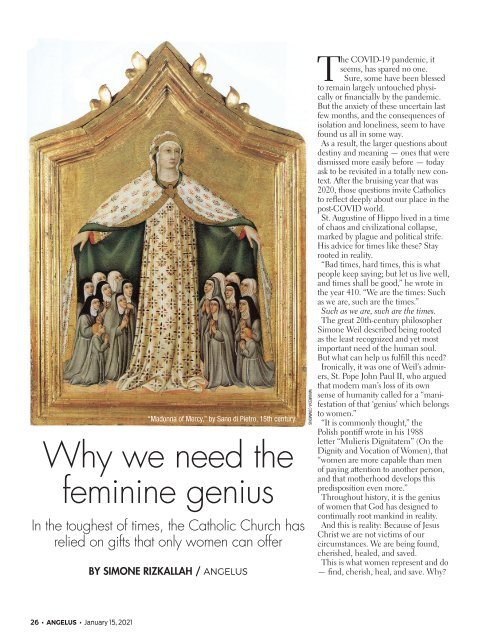You also want an ePaper? Increase the reach of your titles
YUMPU automatically turns print PDFs into web optimized ePapers that Google loves.
“Madonna of Mercy,” by Sano di Pietro, <strong>15</strong>th century.<br />
Why we need the<br />
feminine genius<br />
In the toughest of times, the Catholic Church has<br />
relied on gifts that only women can offer<br />
BY SIMONE RIZKALLAH / ANGELUS<br />
WIKIMEDIA COMMONS<br />
The COVID-19 pandemic, it<br />
seems, has spared no one.<br />
Sure, some have been blessed<br />
to remain largely untouched physically<br />
or financially by the pandemic.<br />
But the anxiety of these uncertain last<br />
few months, and the consequences of<br />
isolation and loneliness, seem to have<br />
found us all in some way.<br />
As a result, the larger questions about<br />
destiny and meaning — ones that were<br />
dismissed more easily before — today<br />
ask to be revisited in a totally new context.<br />
After the bruising year that was<br />
2020, those questions invite Catholics<br />
to reflect deeply about our place in the<br />
post-COVID world.<br />
St. Augustine of Hippo lived in a time<br />
of chaos and civilizational collapse,<br />
marked by plague and political strife.<br />
His advice for times like these? Stay<br />
rooted in reality.<br />
“Bad times, hard times, this is what<br />
people keep saying; but let us live well,<br />
and times shall be good,” he wrote in<br />
the year 410. “We are the times: Such<br />
as we are, such are the times.”<br />
Such as we are, such are the times.<br />
The great 20th-century philosopher<br />
Simone Weil described being rooted<br />
as the least recognized and yet most<br />
important need of the human soul.<br />
But what can help us fulfill this need?<br />
Ironically, it was one of Weil’s admirers,<br />
St. Pope John Paul II, who argued<br />
that modern man’s loss of its own<br />
sense of humanity called for a “manifestation<br />
of that ‘genius’ which belongs<br />
to women.”<br />
“It is commonly thought,” the<br />
Polish pontiff wrote in his 1988<br />
letter “Mulieris Dignitatem” (On the<br />
Dignity and Vocation of Women), that<br />
“women are more capable than men<br />
of paying attention to another person,<br />
and that motherhood develops this<br />
predisposition even more.”<br />
Throughout history, it is the genius<br />
of women that God has designed to<br />
continually root mankind in reality.<br />
And this is reality: Because of Jesus<br />
Christ we are not victims of our<br />
circumstances. We are being found,<br />
cherished, healed, and saved.<br />
This is what women represent and do<br />
— find, cherish, heal, and save. Why?<br />
26 • ANGELUS • <strong>January</strong> <strong>15</strong>, <strong>2021</strong>


















